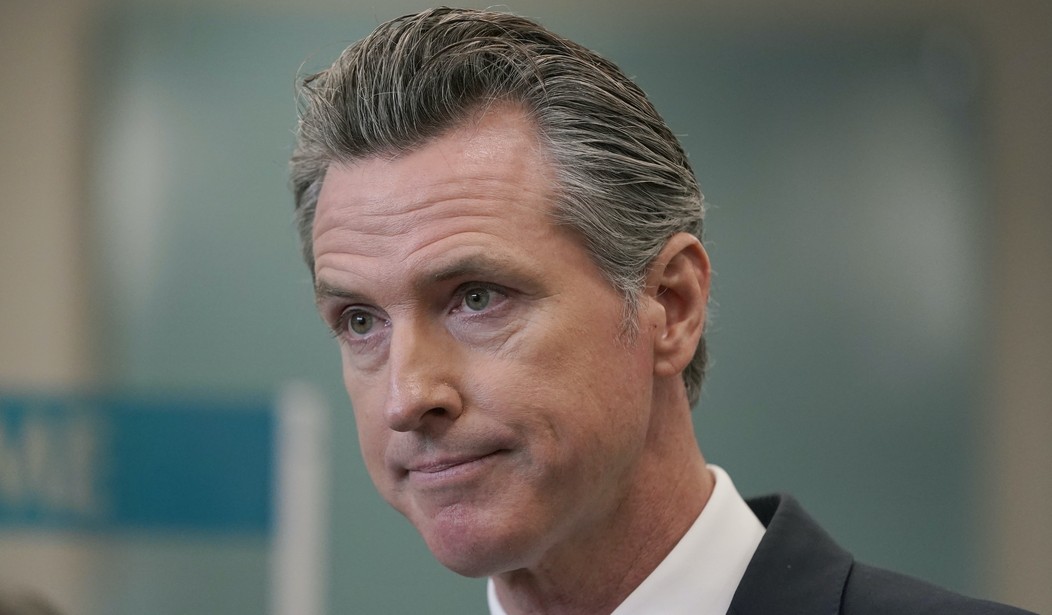If Gov. Gavin Newsom's treasured gun control laws are truly effective at preventing violent crime and not just curtailing the exercise of a fundamental right, then why is the governor flooding the city with law enforcement in the hopes of getting a grip on the spiraling rates of violence?
Earlier this week the governor announced he was deploying 120 California Highway Patrol officers to the city to help police make more arrests, and today he followed up that proclamation with news that scores of CalDOJ attorneys and even attorneys with the California National Guard are heading to "Wokeland" to aid in prosecuting “significant cases targeting major criminal networks in Oakland and the East Bay."
Why is this necessary? Shouldn't all of California's gun control laws be sufficient to prevent those major criminal networks from operating in the Bay Area? I mean, Newsom regularly declares that they're vital to public safety in the state, especially when a federal judge decides they violate the Second Amendment. The truth is that Oakland serves as a daily reminder that no matter how many restrictions he places on lawful gun owners, criminals emboldened by the state's soft-on-crime policies, prosecutors, and judges are literally getting away with murder... as well as carjackings, assaults, and other crimes. Newsom's own policies are a big part of the problem, but there are plenty of locals in Oakland who are also pointing the finger at his partner in the announcement.
[Alameda County District Attorney Pamela] Price, entering her second year of her first term as district attorney, faces a recall effort that has been deeply critical of her push to reshape how justice is administered in Alameda County.
The longtime civil rights attorney has been vocal about reducing prison sentences and sentencing enhancements for criminal defendants as a local means of combatting the nation’s legacy of mass incarceration. Yet opponents say her policies have gone so far as to embolden people to break the law — pointing to charging decisions that, they say, were too lenient for the crimes alleged.
Recall supporters face a March 5 deadline to turn in slightly more than 73,000 signatures to get the recall question before voters.
Just a few years ago Oakland was moving in the right direction. Between 2012 and 2017, homicides dropped by more than 40 percent in the city, a remarkable statistic that many locals credit to the program known as Ceasefire, which involved a targeted deterrence approach that focused both law enforcement and community efforts on the tiny portion of the city's population who are the most likely perpetrators and victims of violent crime. A recent audit of the initiative found that the city started to move away from this effective approach in 2017, and the results have been disastrous.
To understand what’s driving Oakland’s current spike in gun violence, the California Partnership for Safe Communities analyzed 388 shooting incidents between January and September of 2023. They found that there hasn’t been a major shift in the age, demographics, or social networks of the people who are most at risk. This finding, they said, is evidence that what has changed isn’t the nature of the problem—rather, it’s the city’s strategy.
Most of the people involved in shootings in 2023 were Black and Latino adult men who have been impacted by the criminal justice system and are linked to gangs or groups. This is roughly the same population that was most impacted by gun violence when Ceasefire launched over a decade ago. The auditors noted there has been a decline in the quality of intelligence regarding gang violence.
The California Partnership for Safe Communities team identified several decisions that degraded the effectiveness of Ceasefire.
One of the first setbacks occurred in 2016 after local media reported about a teenager who had been sex trafficked by Bay Area law enforcement officers, including members of OPD. At the time, OPD was collaborating on Ceasefire with an organization called Oakland Unite, which would eventually transform into the Department of Violence Prevention.
The scandal shattered public trust in the department, and by extension, the Ceasefire program. Cunningham said Oakland Unite decided to take fewer Ceasefire clients after the scandal, weakening the reach of the program.
Another significant factor behind Ceasefire’s decline was the creation of the Violent Crime Operations Center. Former Chief Armstrong announced this project in April 2021 as Oakland was reeling from 34 homicides. The VCOC focused department resources on solving crimes instead of preventing them from happening.
The new audit states that VCOC’s mission weakened Ceasefire, but it also failed to boost Oakland’s clearance rate for serious crimes—the percent of crimes in which OPD was able to identify and arrest a suspect and recommend charges to the district attorney, or close the case for another reason. Oakland’s homicide clearance rate declined from 50% in 2020 to 35% in 2022.
The same chief who made the ill-fated decision to creat VCOC also proclaimed, by the way, that what the city needed were good witnesses, not armed citizens who could protect themselves or others.
LeRonne Armstrong may not be the chief anymore, but the disastrous policies he implemented along with officials like former Mayor Libby Schaaf are still wreaking havoc on Oakland residents, while the governor's anti-gun agenda is making it extraordinarily challenging for them to exercise their Second Amendment right to armed self-defense.
Gavin Newsom is clearly eyeing a future in the White House, and Oakland's crime woes could give him a black eye in any future campaign. That's why he's hitting the panic button and flooding the city with extra cops and prosecutors, even though doing so is at least a tacit admission that his gun control laws have failed to make the city a safe place as promised.









